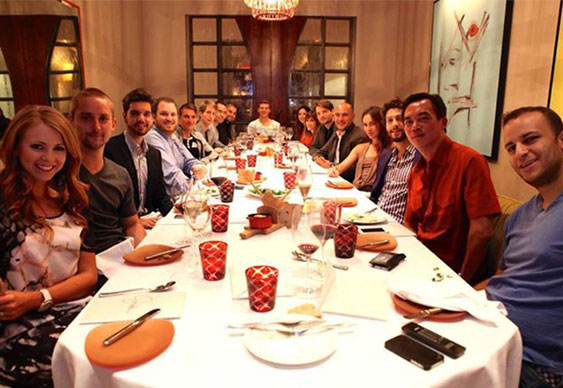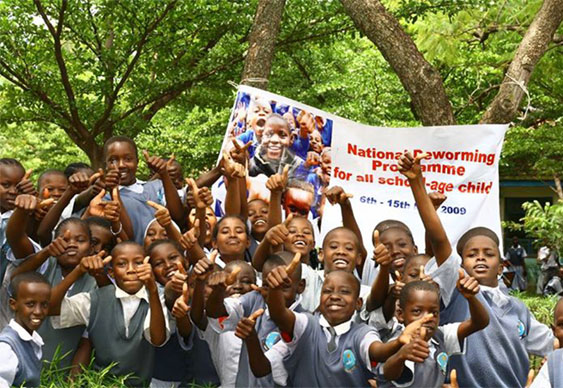Raising for Effective Giving
Wednesday, 3 September 2014
Liv Boeree, Philipp Gruissem, Igor Kurganov on giving it away.
Liv Boeree, Philipp Gruissem and Igor Kurganov have combined live tournament winnings of close to $20 million, but you won't find them blowing it all on girls and supercars. Bluff Europe meets Raising for Effective Giving.
Imagine winning an enormous High Roller event on one of the biggest poker tours in the world. Out of the rabble of top pros who also stumped up the six-figure buy-in, you are the only one left standing. Flashbulbs pop and crowds jostle and cheer as you are presented with the trophy, while the spoils of your victory are laid out on the felt: fat bricks of money stacked in lofty towers, to the tune of over a million dollars.
What comes next, in your mind's eye? A raucous party at an exclusive nightclub? Perhaps a sprawling luxury mansion with pool and tennis courts? If that doesn't tickle your fancy, maybe an endless parade of turbo-charged supercars and champagne-sodden glamour models?
Whatever you dreamily considered, there's one option that probably didn't immediately present itself – giving it away.
Yet that's exactly what a group of some of the highest-earning players – namely, poker superstars Philipp 'Philbort' Gruissem, Igor Kurganov and Liv Boeree – are doing. Now, they're not giving away 100% of their winnings. Instead, they are pledging to make an ongoing commitment, using their (very considerable) poker wealth in order to give to a very specific set of charities, in a very specific way (but more on that later).
Not only did Gruissem, Kurganov and Boeree decide to donate a significant percentage of their own hard-earned dosh, but they are now actively encouraging other poker players to do the same. They are all senior board members of Raising for Effective Giving (REG), a recently-launched organisation that specifically targets poker pros and others in the industry. As a means of gathering donations, REG asks all members to commit to donating 2% of their gross poker winnings quarterly. On the surface, it doesn't sound all that much. Think of the million-dollar scores that some of these guys are regularly managing, though, and it quickly adds up to a formidable sum.

This is no ordinary charity donation, however. REG is built on the idea of 'effective altruism', a philosophy that aims to replace the inefficient sentimentality that pervades the charitable sector today with ruthless pragmatism. The players first came into contact with this movement in the flesh when they flew out to Switzerland to visit GBS Schweiz, a meta-charity that attempts to determine how to do the best good by focusing on science, ethics and rationality. Since then, they have clubbed together in the formation of REG.
“Most people have an instinct to help people around them – that's altruism,” explains German high-stakes hotshot Philipp Gruissem. “We want to take it to the next level and use our finite resources in the most effective way. Effective altruism is just when you try to maximise your positive impact on the world in a practical way.”
“The whole concept is that right now, charity is treated very emotionally,” continues Phil. “This is instead of the way we want to have it treated – like a business.”
It's an idea that certainly would appeal to the average mathematically-minded poker player. Using its belief in effective altruism, REG gives only to the charities that it sees as using their money in the most efficient way possible. To put it simply, it dismisses the typical 'emotive' factors, and digs down to see which charities will quantitatively get you the most bang for your buck.
Liv Boeree, who can be counted as one of the most well-known British pros active in the poker world today, is especially passionate about this rational approach. “It all comes down to the assumption that all lives are equal,” clarifies Liv. “If we believe that, then we have 'X' amount of money being donated this year from all over the world. This is a finite amount, and if all lives are equal, then we should send that money to the place where, for that amount, the maximum number of lives are saved.”
“A lot of people get emotional about it – they say, 'I see all around me people dying of cancer.' Okay fine, let's say we take all of this 'X' money that is available and put it into those causes, which a lot of people would emotionally want to do – that's only really because the people all around them are in Western countries, where each person costs a relatively huge amount. You can maybe only save 1,000 people with that 'X' amount of money given to that charity, but if you send it to a place where the money goes a hell of a lot further and saves 20,000 lives, then it's 20x more effective.”
One of the biggest causes that REG supports is a charity called 'Deworm the World', which uses its money primarily to introduce measures to protect children from parasitic worm diseases. It's pretty safe to say that this isn't the 'sexiest' charity out there. However, when you drill down into the numbers, not only does this improve the basic health of the children affected (even saving some from premature deaths), but it also drastically increases their school attendance, and as a result, their long-term earnings in later life. When it gets down to the cold hard numbers, it's a helluva lot more effective than some of the charities that typically make you go “D'awww”.
“Usually the charities advertising with the saddest-looking child on the screen will get the most donations – they’re most emotionally appealing,” says Liv. “Actual death statistics are less popular, but so much more important. Donors can save thousands more lives by paying attention to them. In personal financial decisions, we obviously pay close attention to the numbers. The same should go for our charitable decisions, where much more is at stake: the lives of thousands of people, which depend on the quality of our decisions.”
A Busto EpiphanySo how did three of the most successful players in the world come to get involved with setting up a charity? Did they feel guilty about profiting from poker – a game where for you to win, it is necessary for somebody else to lose?
Igor Kurganov, who currently has over $7.6 million in live tournament earnings, looks thoughtful. “With regards to feeling bad about poker, I never had an ethical problem with taking money from someone who sits down at the table, because they are adults of reason and age,” he says reasonably.
“There might be a different argument for gamblers, but at least it's more slowly lost in poker compared to other casino games. I didn't have a big problem with people losing, but I also didn't see any good coming out of it. It was just neutral. It was a thing that let you live life in an easier way. You win money to give yourself freedom, but then what are you getting that all for? Yes, to live, but where is it going? After a while you've got to ask yourself what else you want to do.”
The morality of being a professional poker player is a topic that has hit the news hard recently, after One Drop winner Daniel Colman declined all interviews. In a later statement, Colman caused a wave of controversy by saying that he doesn't “owe poker a single thing”, referring to it as a “very dark game” that “targets people's weaknesses”, that he consequently refused to promote.
Gruissem evidently empathised Colman, who received a lot of backlash for his comments. He even wrote a blog on the REG website, telling people, “Don't hate on Dan Colman. It feels to me that he felt wrong about the next step so he chose to voice his concerns without knowing exactly how to proceed. He is having a moral dilemma and has not yet found the solution.” Gruissem also talks about the importance of leading a balanced life, concluding by saying, “Trust me, the only way to be 100% happy if you are living in this poker world is to give back.”
Does his having said that mean that he felt uneasy about the ethics of being a pro poker player? Phil pauses, considering his answer. “I never felt BAD about being a poker player exactly, but it never felt like, 'Oh, this is the thing I wanna do'. I never felt like I was totally in the right spot.”
Liv seems to have experienced a similar feeling of restlessness that came as part and parcel of her success. “I love the game, and have had the most unimaginably fantastic seven years since I began playing,” she says sincerely. “I made the goal to become a poker player when I was around 22. I'm 30 now. But after playing for the first few years, I knew this wasn't going to be my destiny for the rest of my life. I always wanted to do more, and I've always seen poker as a stepping stone to that. I've gotten quite well-known, I've built up a Twitter following – but what am I going to do with that? I don't want to just be talking about poker to everybody for the rest of my life!”
“I love poker and I don't see myself not playing it any time soon, but I realised that I've got to find a way to be contributing more. If I'm 30 years old and I haven't done anything else to help the world, then I'm going to be pretty disappointed in myself. So for me, this makes perfect sense of how to fulfil that inner need, and how to continue having this life that I absolutely love.”
The Anti-BilzeriansIt doesn't take a genius to notice what has been dubbed the 'Dan Bilzerian effect' – the fact that the poker media tends to glamourise reckless acts of degeneracy and hedonism. Rather than stories of charity, you're much more likely to read about a pro who went mental one evening and spent hundreds of thousands on nightclub bottle service for him and a posse of porn stars.
When asked about the culture of blowing money for the sake of it, Gruissem laughs wryly. “All poker players experience the same thing. They get the freedom to do a lot of stuff, so they try out things. They try out things that they don't need, then they skip to the next thing. Everyone has crazy parties at some point, and try to find happiness there. Then they try to buy stuff, and try this and that and everything. Honestly, all of us here tried this stuff!” Igor and Liv murmur a laughing assent in the background. “We eventually figured out it's not helping at all. We want to save the poker players a lot of time and money that they're going to waste on stupid things!” More laughter. “Hopefully they'll get there faster than we did.”
You might think that having multiple tournament wins of over a million dollars might mean that you start to forget about the value of money – but not so. “I think what really decreases the value of money in our mind is that we went broke a couple of times,” answers Gruissem honestly. “You suddenly recognise that the money is not that important if you've gone through that. Everybody has a lot of fears about going broke – because of the social conditioning, you see it as a fail. You think it's the end of the world. As a poker player, I think most of us have gone through that, and we realise, 'Oh! It's not the end of the world! It's not that bad, actually.'”

Igor Kurganov agrees, coming back to the certain controversial media darling mentioned earlier. “Most people who look for poker look for the freedom that comes with it, then start to use the money for instant-gratification things like partying or buying themselves something nice, trying to live the 'Dan Bilzerian lifestyle' in some ways. You start identifying yourself as someone who has money. What was so great about going broke afterwards is that all of this is then taken away from you. What you thought you were able to do, and what you thought you were – because of what you had – is gone. That brings you simply to the spot where now you have to find your own value and happiness without the things you thought you were before. You notice in a very easy way that you can actually be happy without all of that, and have a much longer-lasting happiness with a good social circle, or a good schedule and lifestyle that's more focused on being content.”
But Boeree is keen that their words are not misconstrued – achieving a longer-lasting happiness doesn't mean you have to give up ALL life's selfish pleasures. “We're not advocating that everyone should give up everything they own and go and live the life of a Buddhist monk!” says Liv quickly. “We're saying that people look at Capitalist culture, and the 'Dan Bilzerian lifestyle', and make idols out of amassing as much personal wealth as possible and that's the dream – girls, chicks, guns and booze, and so on. The point is, you can still amass personal wealth to set up your security for the future. But there's a limit to how much wealth you really need. Do you think a billionaire is a thousand times happier than someone who has one million dollars? No. They're just not.”
At the end of the day, the players all agree that poker is essentially a selfish game – but that doesn't mean what you do with it has to be, too. Of course, there is an argument that charity is necessarily an anti-selfless act since it makes you feel good about yourself, but Liv Boeree disagrees. “It depends on whether you believe that that feeling of happiness is a selfish feeling,” she replies fairly.
“I can see arguments both ways on that question. However, I strongly believe that happiness and positive emotions can be quite contagious (as can negative emotions – you will often find yourself 'catching' the mood of others you are close to). So if the net effect of the giver's personal happiness and satisfaction from their good deed also raises the moods of the people around them, it can only add weight to the argument that it is a truly selfless act!” That's good enough for us.

Raising for Effective Giving certainly seems to have got off to a flying start, with big names such as John Juanda, Sorel Mizzi and Scott Seiver turning up to celebrate its official launch dinner during the World Series of Poker. Even poker's resident motormouth Daniel Negreanu has blogged about it, applauding it as a brilliant idea. It remains to be seen how many of the game's other millionaires will jump on board, but just imagine how much money would be at stake if 50 of poker's top earners all pledged to donate their quarterly 2%. Those are NOT small numbers. It would be game-changing.
For now, though, what advice would the guys give to a pro poker player who wants to improve their life satisfaction?
“You have to realise that poker is not absolutely the only thing that you have to focus on,” Igor says firmly. “Generally, when you're too obsessed with one thing, it's not going to be what makes you happy. You'll also feel much better about the work you do if you can have some sort of social impact – you can do the best by helping the most people you can.”
For Liv, it's all about looking at the bigger picture. “As early on as you can, start figuring out what your higher purpose is, whatever it is. If you read about something or watch the news and see something that's nothing to do with poker but actually gets you worked up in some way – gives you a fire, gives you a drive – that's what you need to be focusing on.”
For more info on Raising for Effective Giving, check out www.reg-charity.org.